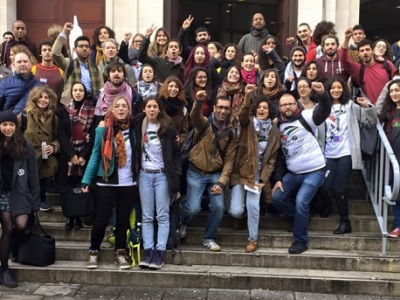
By Haidar Eid – Gaza
When we, Palestinian Civil Society, issued our 2015 BDS call, we were counting on people of conscience, rather than governments and complicit corporations. Most of us argued that we needed to address ordinary people buying goods in supermarkets, artists, cultural figures, academics, sportsmen…etc We, in fact, had our own definition of the “International Community” as opposed to that of the traditional leadership, be it on the right or on the left. Our “International Community” consisted of civil society, churches, pension funds, municipalities, clubs, music bands, universities…etc.
We wanted to isolate Israel’s regime of oppression as well as corporations and institutions that are implicated in its denial of Palestinian rights under international law. We made it absolutely clear that we wanted the movement to be inclusive and be anchored in the Universal Declaration of Human Rights.
Based on this, we were confronted with questions about what would be considered normalization and what not! We, therefore, worked on what has become the anti-normalization criteria that were adopted by a near-consensus of the largest Palestinian civil society entities since November 2007, at the first national BDS conference. We specifically called for “boycotting events and activities that portray the relationship of colonial oppression, which is inherently abnormal, as if it were normal.” We argued that this kind of activities contribute to whitewashing Israel’s crimes—occupation, apartheid, and settler colonialism– against the Palestinian people.
Inspired by the South African anti-apartheid model, we went further and issued what became the boycott guidelines to guide people who have heeded our call all over the world, and to counter 14 years of the façade of the “peace” industry and its culture of normalization. Those projects had to some extent given a false impression of symmetry/parity between the oppressor, Israel in this case, and the oppressed, Palestinians. 14 years of “negotiations” between the two parties had obfuscated the line separating colonizers and colonized and made them both look equally responsible for the “conflict!” So, Israel’s multi-tiered system of oppression, namely occupation, colonization and apartheid had been reduced to a “conflict!” This, for Palestinian Civil Society, is “intellectually dishonest and morally reprehensible,” and any project that promotes them “ought to be boycotted.”
BDS is, nevertheless, undogmatic, as claimed by a minority of “liberal” voices. It made it absolutely clear that it welcomes cooperation with those Israelis who recognize our basic rights under international law, including right of return and involves a common struggle, “co-resistance,” against Israel’s oppression of the entire Palestine people, whether in the 67 occupied territories, or the Diaspora, or the 3rd class citizens of the state of Israel.
– Haidar Eid is a member of The Palestinian Campaign for the Academic and Cultural Boycott of Israel (PACBI) and Al-Shabaka (The Palestinian Policy Network) Policy Adviser. He is the author of Worlding Postmodernism: Interpretive Possibilities of Critical Theory. He contributed this article to PalestineChronicle.com.






The Arabs citizens in Israel enjoy equal rights and are better off than their fellow Arabs outside, and none of them would want to live in an Arab country. Don’t believe me? Ask them!